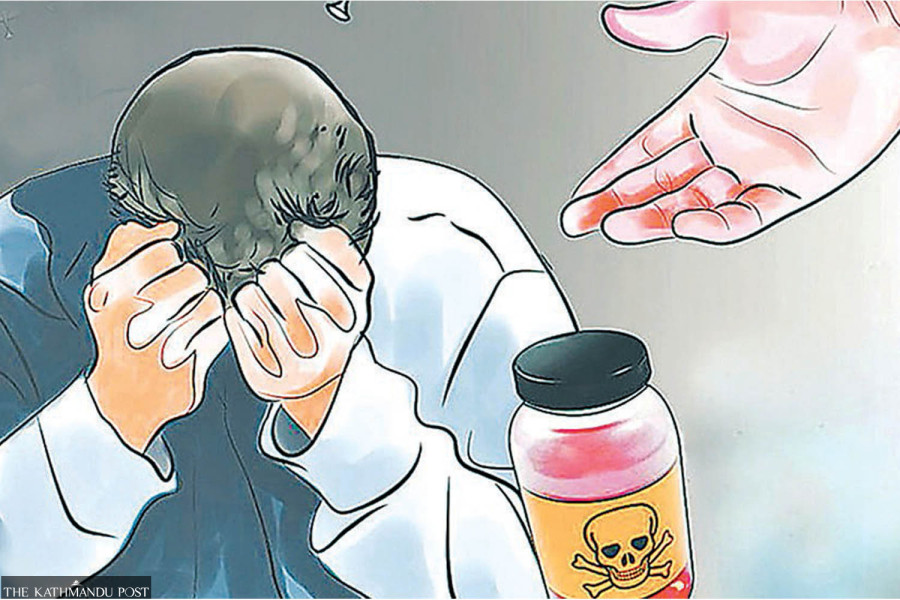Health
Nepal bans three more pesticides to tackle growing suicide cases
Nepal police data show suicide cases fell sharply following past bans on highly toxic pesticides.
Arjun Poudel
Nepal has banned additional three hazardous pesticides—paraquat dichloride, chlorpyrifos and phorate—which are not only being used to kill pests but are also being misused for suicide.
“The Pesticide Management Committee has decided to prohibit the production, synthesis, export, import, transport, commercial use, storage, and sale of the said pesticides in the country,” reads the order published in the Nepal Gazette on Thursday.
Poison ingestion, mostly involving pesticides, is the second leading cause of suicide in Nepal after hanging. According to data provided by the Nepal Police, 952 people killed themselves by consuming poison in the fiscal year 2023-24.
“Poison is easily available in every household in rural areas across the country, as farmers often keep it in the house to use in crops,” said Dr Dilli Ram Sharma, former director general at the Department of Agriculture. “These hazardous substances are easily available in agri-veterinary shops and are not only being used in plants but also for suicide in our country.”
Earlier, in 2018, the country banned eight pesticides—carbofuran, dichlorvos, triazophos, carbaryl, benomyl, carbosulfan, dicofol, and aluminum phosphide. Following the ban, suicides by poison ingestion have dramatically declined, according to Nepal Police report.
Police data show that 1,320 people died by poison ingestion in 2018-19, the year authorities banned eight pesticides commonly used for suicide. The numbers dropped to 1,136 in 2019-20; 1,276 in 2020-21; 1040 in 2021-22 and 932 in 2022-23.
Sharma said that traders can sell their existing stock of banned poisonous substances for up to two years, but cannot import more.
“These pesticides are so hazardous that they can cause cancer, paralysis, renal failure, heart diseases in children, and deformities in newborn babies if used for a long time,” said Sharma. “Many countries, including India, have banned these pesticides.”
After the ban on aluminium phosphide in 2018, people in crisis began ingesting chlorpyrifos, which is widely available on the market.
Studies show that banning highly hazardous pesticides is a cost-effective and affordable intervention to reduce suicide rates.
Nepal is among the countries with the highest suicide rates. The country witnessed an alarming rise in suicide cases in the last fiscal year.
According to data provided by the Nepal Police, 7,223 people killed themselves in the fiscal year 2023-024, which is the highest ever recorded in a year.
“Restricting access to commonly used hazardous pesticides will help reduce deaths from suicides,” said Dr Rakesh Ghimire, principal investigator of Nepal for the Center for Pesticide Suicide Prevention at the University of Edinburgh of the United Kingdom, which has been carrying out research on suicides by poison ingestion in Nepal. “Many people who are in a moment of crisis can change their minds if they do not have access to poisonous substances.”
Studies show that a ban on a few highly hazardous pesticides in Bangladesh, South Korea, and Sri Lanka, among others, led to sharp reductions in overall suicide rates.
Pesticides are commonly used to get rid of insects, fungi, weeds and diseases which damage plants and crops. Every year more than 1,300 metric tons of 135 types of pesticides, including insecticide, fungicide, herbicide and biopesticide, are brought into Nepal, according to the Plant Protection Directorate of the Ministry of Agriculture and Livestock Development.
Doctors say high levels of pesticides in fruits and vegetables cause nausea, diarrhoea, abdominal cramps, dizziness and anxiety. Long-term consumption of fruits and vegetables with high levels of pesticides can lead to kidney failure, lung disease and mental health problems, and can even cause cancer. According to health experts, the consumption of such fruits and vegetables may also affect pregnant women and harm the foetus.




 18.12°C Kathmandu
18.12°C Kathmandu















